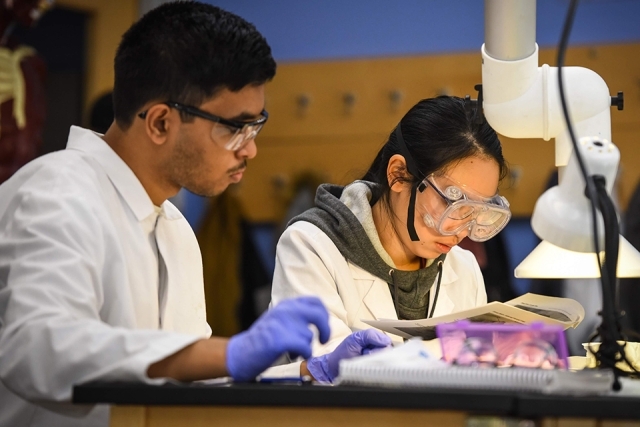
The William Randolph Hearst Foundation has awarded a $125,000 grant to St. John’s University’s College of Pharmacy and Health Sciences (CPHS) to establish the William Randolph Hearst Expendable Scholarship Fund to benefit prospective and current students who are historically underrepresented. The funding provides at least 25 partial scholarships to academically qualified and/or deserving minority students enrolled in the College.
While the Hearst scholarship benefits students regardless of major, it has a particularly significant impact on Doctor of Pharmacy students, who are ineligible for state or University financial aid once they begin their fifth year of this six-year program. Scholarship support covers tuition and related fees, and access to industry-specific programming.
“Trends indicate a shortage of diverse health-care professionals and biomedical researchers,” remarked Rev. Brian J. Shanley, O.P., President of St. John’s.
“True to St. John’s mission to provide an opportunity to those who need it most—and where one might otherwise not exist—there has never before been a greater need at the College to raise scholarship funds to help recruit and retain talented but underrepresented students.”
“Scholarship support is vital to reducing the financial burden of a college education and helps to enable students to pursue their dreams,” stated Russell J. DiGate, Ph.D., Dean and Professor, College of Pharmacy and Health Sciences. “It is critically urgent for those students who continue to face financial hardships in the wake of the COVID-19 pandemic and will serve as an important recruitment tool for the College.”
Building on a commitment to cultural diversity, and benefiting from the University’s metropolitan location, the College strives to educate students to become effective leaders, good citizens, and moral and ethical individuals. Students are equipped with the education, training, and support they need to meet the present and future demands professionals encounter as pharmacists, physician assistants, clinical laboratory scientists, toxicologists, radiologic technologists, and biomedical researchers.

“The Hearst Foundations are the gold standard of foundational support as they identify and fund outstanding nonprofits to ensure that people of all backgrounds in the United States have the opportunity to build healthy, productive, and inspiring lives,” observed Christian P. Vaupel, Ed.D., Vice President for Advancement and University Relations.
Approximately 2,100 students are enrolled in the CPHS, which is accredited for pharmacy and health sciences programs. The College confers approximately 360 undergraduate and entry-level degrees, including nearly 250 Doctor of Pharmacy (Pharm.D.) degrees, and about 50 graduate degrees each year.
Among the University’s Pharm.D. graduates, more than 90 percent obtain employment in the field within six months of graduation and approximately 10 percent pursue postgraduate training, such as residencies, fellowships, or master’s programs. The College is affiliated with more than 350 teaching sites, over 1,180 preceptors, and C-suite alumni at Memorial Sloan Kettering Cancer Center, NYC Health + Hospitals, and NewYork-Presbyterian Queens, which creates access to broad scientific and interprofessional collaborations.
Nearly 60 percent of CPHS students are persons of color, 44 percent are Pell Grant-eligible, 22 percent are the first in their family to attend college, and 10 percent are bilingual. Approximately 15 percent of undergraduate and graduate students enrolled in the CPHS are Black/African American and/or Hispanic/Latinx. The student retention rate across the College is 90 percent and 81 percent among minority students.
The influx of new scholarship support will enable students to consider unique immersion programs nationally and internationally. This will give them the opportunity to assist in delivering health-care services to the poor and underserved—recognizing that service to others is a transformative part of the St. John’s learning experience.
Related News
Q&A with Christopher E. Fisher, Psy.D. ’14M.S.Ed., LEAD Honoree
Christopher E. Fisher, Psy.D. ’14M.S.Ed., Licensed Clinical Psychologist and Director, Behavioral Health in Zucker Hillside Hospital, will be among several alumni honored by The School of Education...
Q&A with Alicia Calabrese ’94SJC., LEAD Honoree
Alicia Calabrese ’94SJC, Principal of Floral Park Memorial High School, will be among several alumni honored by The School of Education (TSOE) at the 15th Annual Leaders in Education Awards Dinner...
Q&A with Brenda Almendarez-De Bello ’06M.S.Ed., ’19Ed.D., LEAD Honoree
Brenda Almendarez-De Bello ’06M.S.Ed., ’19Ed.D., Principal of Tamarac Elementary School in the Sachem Central School District , will be among several alumni honored by The School of Education (SOE) at...
